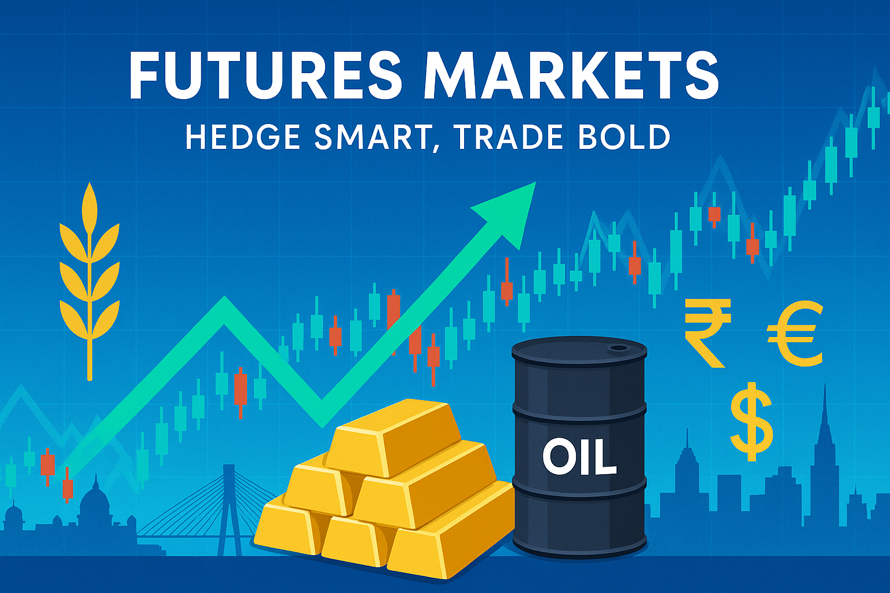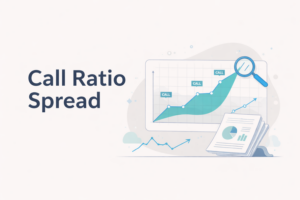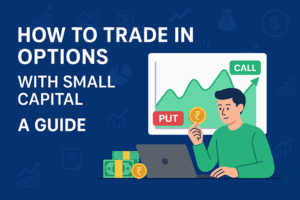Futures Market: What It Is and How It Works for You

Introduction
Have you ever wondered how businesses lock in prices for the future or how traders bet on market trends? That’s where the futures market comes in. It’s a place where people trade contracts that promise to buy or sell things—like gold, oil, or even stock indexes—at a set price on a future date.
This blog breaks down how the futures market works, who trades in it, and the risks you need to know. Let’s keep it simple and practical, so you can understand how futures could fit into your investment journey.
What is a Futures Contract?
A futures contract is an agreement between two parties. They agree to buy or sell something at a set price on a specific future date. For example, a wheat farmer can lock in a price for their harvest today, even if the sale happens months later.
These contracts are traded on big exchanges like the Chicago Mercantile Exchange (CME) or Intercontinental Exchange (ICE). You don’t have to worry about your counterparty not paying up—exchanges have clearinghouses that make sure deals are honored.
Futures cover a wide range of things—commodities (like oil, gold, or sugar), stock indexes (like the Nifty 50), and even cryptocurrencies (like Bitcoin).
Why Trade Futures?
There are two main reasons:
- Hedging
Businesses use futures to protect against price changes. For example, an airline might buy fuel futures to lock in fuel costs for the next few months. - Speculation
Traders use futures to try and make a profit from price movements. If they think prices will go up, they buy; if they think prices will drop, they sell.
This mix of hedgers and speculators keeps the market liquid and running smoothly.
How Futures Markets Work
Here are the key points you should know:
- Standardization: Futures contracts have fixed terms—like quantity, quality, and expiry date. That makes them easy to trade.
- Leverage: You only need a small percentage (called margin) to control a large contract. This boosts gains, but also risks.
- Daily Settlement: Profits and losses are settled daily. This process is called mark-to-market.
- Expiration: Futures have an end date. You must either settle the contract or roll it over.
- Risk: Futures trading is risky. Leverage can magnify losses. Prices can swing wildly due to market news or events.
Advantages of Futures Trading
- Price Discovery: Futures prices reflect what the market expects in the future. They help businesses and traders make informed decisions.
- Risk Management: Hedgers use futures to lock in prices and protect against swings.
- Liquidity: There’s usually a buyer or seller available, making it easy to enter or exit trades.
- Diversification: Futures allow exposure to different markets—commodities, stocks, currencies, and more.
Risks to Watch For
- Leverage Risk: Small price changes can lead to big losses.
- Volatility: Prices can move fast, often unpredictably.
- Margin Calls: If losses mount, you’ll need to add funds to your account.
- Basis Risk: Sometimes, futures prices and actual market prices don’t match perfectly.
- Liquidity Risk: Not all contracts have enough buyers and sellers, especially in less popular markets.
Should You Trade Futures?
Futures aren’t for everyone. They demand knowledge, discipline, and a solid risk plan. If you’re just starting, consider paper trading or using small contract sizes (like micro futures) to learn.
For Indian investors, futures on the NSE (National Stock Exchange) offer a starting point—especially index futures on the Nifty 50 or Bank Nifty.
FAQs
Q1. What is the main purpose of futures markets?
To help businesses and investors manage price risks and to provide a platform for speculation.
Q2. How is futures trading different from stock trading?
Futures involve contracts with expiry dates, leverage, and daily settlement. Stocks can be held indefinitely.
Q3. Is futures trading risky?
Yes. The use of leverage means losses can exceed your initial investment.
Q4. Can I start futures trading with a small amount?
Yes, but it’s best to start with micro futures or index futures on Indian exchanges like NSE.
Q5. Are futures markets open 24/7?
Mostly yes, especially for global contracts like crude oil and currencies. Indian futures markets have set trading hours.
Disclaimer
The stocks mentioned in this article are not recommendations. Please conduct your own research and due diligence before investing. Investment in securities market are subject to market risks, read all the related documents carefully before investing. Please read the Risk Disclosure documents carefully before investing in Equity Shares, Derivatives, Mutual fund, and/or other instruments traded on the Stock Exchanges. As investments are subject to market risks and price fluctuation risk, there is no assurance or guarantee that the investment objectives shall be achieved. Lemonn (Formerly known as NU Investors Technologies Pvt. Ltd) do not guarantee any assured returns on any investments. Past performance of securities/instruments is not indicative of their future performance.







